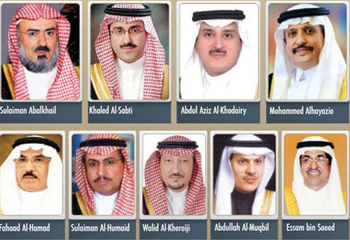 Riyadh, Dec 9: Custodian of the Two Holy Mosques King Abdullah on Monday announced a major Cabinet reshuffle, removing six ministers and appointing eight new ministers for health, higher education, transport, agriculture, social affairs, communications and information technology, culture and information, and Islamic affairs.
Riyadh, Dec 9: Custodian of the Two Holy Mosques King Abdullah on Monday announced a major Cabinet reshuffle, removing six ministers and appointing eight new ministers for health, higher education, transport, agriculture, social affairs, communications and information technology, culture and information, and Islamic affairs.
The current oil and finance ministers would remain in place. The vacant health post has now been filled with Mohammed Alhayazie, former rector of Jazan University.
Abdul Aziz Al-Khodairy, former chief executive officer of King Abdullah Public Education Development Project (Tatweer), takes over the vacant culture and information post.
King Abdullah appointed Khaled Al-Sabti new higher education minister replacing Khaled bin Mohammed Al-Anqari. Al-Sabti was the deputy minister of education.
Sulaiman Al-Humaid is the new social affairs minister, replacing Yousuf bin Ahmad Al-Othaimeen. Al-Humaid was a member of the Shoura Council and a former governor of the General Organization of Social Insurance.
Fahaad Al-Hamad becomes new minister of communications and information technology, replacing Mohammed Jamil bin Ahmad Mulla. Al-Hamad was the assistant chairman of the Shoura Council.
Abdullah Al-Muqbil is the new minister of transport replacing Jabara Al-Seraisry. Al-Muqbil was the mayor of Riyadh.
Walid Al-Khereiji becomes agriculture minister replacing Fahd bin Abdulrahman Balghuneim. Al-Khereiji was president of the Grain Silos and Flour Mills Organization.
Sulaiman Abalkhail is the new Islamic Affairs minister, replacing Saleh Al-Asheikh.
The king appointed Essam bin Saad bin Saeed a state minister in addition to his current position as the chief of Cabinet’s Experts Commission.
In the decrees related to security commanders, the King ordered the promotion of Maj. Gen. Sulaiman bin Abdullah Al-Amr, director general of the Civil Defense, to the rank of lieutenant general, and Maj. Gen. Othman Al-Muhrij, director general of public security, to the rank of lieutenant general.






Comments
Add new comment